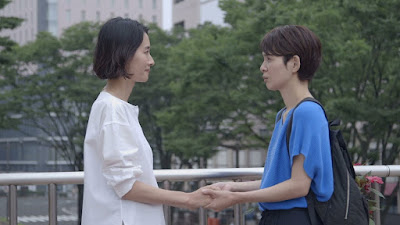Sinuous opener "Magic (or Something Less Assuring)" proceeds from a conversation a photographer's model has in a cab with a stylist besotted with a dream man the model slowly recognises as her problematic ex; the conversation raises certain expectations that get tested, to breaking point, when the man in question eventually enters the frame. It's practically classical short filmmaking - set-up, twist, punchline - but executed with Hamaguchi's now-trademark, exquisitely delicate touch. Likewise, the second short ("Door Wide Open", in which a pair of scheming student fuckbuddies attempt to ensnare one of their professors in a blackmail scheme) flirts with thriller territory, but does so with such discreet elegance (light, uncluttered frames, classical music on the soundtrack) that you barely notice as such. Again, matters hinge on a gradual shift in perspective: the professor, who appears such an unsmiling hard-ass in an early close-up, comes to be revealed - through his words, Hamaguchi's words, and the reading of a pornographic extract from his novel - as vulnerable, tender, human. This is the slowest-burning of the three shorts - and the most static, being largely confined to the professor's office - but it's also the most intriguing, positioning its maker as a potential missing link between Renoir and Rohmer (the humanist who's also a sensualist) or between Kore-eda and Oshima (the optimist who nevertheless notes the capacity humans have to be venal indeed in matters of desire).
That short's pay-off involves a misdirected email; no such problems in the third ("Once Again"), which gestures towards science fiction with its low-key vision of a world forced offline by an Internet virus. It's a timely Covid-era set-up, yes, but it's also a particularly fruitful conceit for a filmmaker of Hamaguchi's sensibility to explore, because it immediately makes the connections he specialises in even more tenuous and haphazard than they can be in our world: everyone's gone back to basics, obliged to rely on a scant handful of barely remembered social skills. The conversation here involves two women - an IT nerd and an unhappy housewife - who intersect at a train station, (mis)recognise one another as schoolpals, and are only slowly revealed to be complete strangers. (Set-up: what would the world look like if Friends Reunited was never a thing, and we no longer had access to Facebook and Instagram?) Their path back to common ground involves a series of conversational sidebars that play out like interactions from alternative realities - or like rehearsals for a later conversation, additional drafts of the same scenario. At the last, Hamaguchi finds his way back to the literary and the theatrical, but the material gains in poignancy from the women's insistence in carrying out these interactions face-to-face, to the extent one of them ends up walking backwards down the street: they cannot bear the thought of losing eye contact, or indeed contact full-stop. You could teach this short to aspirant directors as a lesson in how to evoke meaning and feeling through framing; it ends with a hug that, like away goals in the European cup competitions, suddenly counts double. How exciting to have Hamaguchi arrive now, at a moment when the movies have seemingly started to run out of ideas for what to do with real people in real settings. Wheel of Fortune and Fantasy, at once a renewal of cinema past and an opening up of rich new possibilities, indicates this filmmaker could roll on anywhere, and master anything.
Wheel of Fortune and Fantasy is currently available to stream via MUBI, and available to rent via Prime Video, Curzon Home Cinema, YouTube, Google Play, the BFI Player and the Modern Films Virtual Cinema.

No comments:
Post a Comment